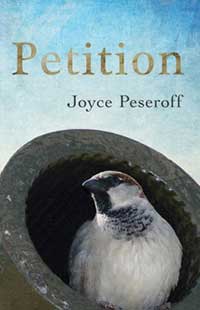 *
*
Review by Dennis Daly
Petitions are like prayers, only they are addressed with more certitude. Humanity seems no more capable of reforming itself in the name of itself or its favorite deity than a distracted Almighty, who has clearly moved on to newer and more interesting subjects. Nevertheless, the very act of petition engenders sympathetic audiences of listeners and possibilities.

PetitionBy Joyce PeseroffCarnegie Mellon University Press
Pittsburgh,
MAISBN: 978-0-88748-661-6
74 Pages
Joyce Peseroff, in her new poetry collection, entitled Petition, makes her idealistic position clear and leads her readers through the daunting and changeable present-day suburban wilderness into her extraordinary alternative world of imagination and hope.
Using an even, never-gritty, tone, Peseroff moves through her diverse themes seamlessly seeking moments of insight, irony, and lyrical profundity. She is a master of her craft.
In her poem Not Far, Peseroff locates herself geographically and pleasantly, noting, in widening and closing circles, the unpleasantness of human reality. Without tapping into the emotional cliché of self-guilt, she makes her point with disquieting, efficacious juxtapositions. Consider this one effective example early in the book:
And further, far from the hum of my new furnace, is a furnace
lit and relit by a warplane’s vector, the pilot burning to powder
city blocks, houses wall to wall, the mother and father inside
churned like concrete, or blasted with shrapnel if they leave,
or by a smoothed-cheeked soldier with an assault rifle.
Light-headed with hunger, they fall under the treads of as tank.
My favorite Peseroff poem in this collection, The Astronauts, charts a parent’s fear of her child’s independence in celestial terms. The needs of imparting wisdom and protecting one’s own contends against the child’s driving desire to discover herself. The poet’s cosmic language works wonderfully. She opens the poem this way:
If I’m the sun, then people I love
whirl past me in elliptical orbits
like comets, once in a hundred years.
And if I’m a planet, each is a moon
with a dark side. Crooked in the arm
of a galaxy, I spiral at light speed,
but since all matter’s in motion I
appear to be sitting still
in an armchair, reading …
Once one locates society’s imbalances and comprehends the brutishness of nature, which may inspire an ongoing stream of petitions, the question becomes, how must one deal with them? Concomitantly, is understanding necessary and, if so, how must one then empathize? And, finally, what about suffering? Does suffering open the door to perception? In Peseroff’s poem Missing Hiker Kept Journal of her Ordeal, terror devolves into pedestrian concerns. And the mind focuses, not on suffering, but on practicality. The poet explains in detail:
“When you find my body, please call”—discovered on a Navy
Training base.
Sun dropped below the clouds. A silver arrow glinted from a blue
Marker—lower on the oak than I expected, three feet of snow
girding its trunk.
A moment of terror. Ten minutes. Nothing, but something
Nothing. Something.
–“my husband George and my daughter Kerry”—notebook
removed two years later, two miles west of the trail, inside her blue
tent.
La Casa Bellina, Peseroff’s poem of friendship, illness, and the healing properties of a devil-may-care attitude, begins with concern, eases into compassion, then onto the horror of a good friend’s bi-polar obsessions. This poet, unlike many others dealing with this same subject matter, finds an answer, a way out through humor and life-affirming giddiness. The poem concludes with a broad word-smile:
…Let’s walk
past the river. Don’t look down—
at the marble step, push open
the door to La Casa Bellina.
We’ll swipe bread from the tables, sip
nectar distilled from honey and fog
and stiff the old libation bearers—
naked under black tuxedoes—
throwing silver as we go.
Cemeteries, always the grist for poetry and those inclined to poetry, often delivers mixed messages to practitioners (very near to petitioners, isn’t it?) of grieving. Time spent with the departed nearly always becomes an issue, a corresponding weight to counter guilt. Peseroff’s poem Visiting My Parents’ Grave follows this schematic in spades. The poet’s addition of a comedic character, Aunt Rita, is ingenious. One can argue the logic or illogic, but Rita’s take on the cemetery makes a lot of sense to me. She tempts death-threatening dangers in order to exit that place. Here is the heart of the poem, lines that set up Rita’s view, projecting near neatness and near contentment:
…Pink marble
lies flush with spikes
of Bermuda grass so the mower
will find no impediment,
and there’s no leaving
the traditional pebble
beside the epitaph my mother
inscribed for them both:
Forever in Our Hearts.
Another mourner’s tree
has leapt from the ground
to shade her words…
Another poem I like especially much Peseroff is entitled Thirst. This piece amounts to an imagistic essay on desire and imagination. In this poem, at least, humankind occupies the center of the universe. Matter or the tangible exists simply, without pizazz, until touched by someone’s consciousness. On the other hand, the fancies and aspirations of our species are nothing until they settle upon the solidity of an object. The poet nails her point of ardor here:
The soul needs a soul-
making vale, the lion a grass-
fed lamb. Dear thirst,
dear life, dear lack—before
desire, the planet was no
gorgeous world, Eden
no poem, the tale no Troy,
Helen a girl herding goats.
And, like the blind poet, who alchemized that simple girlish goatherd into Helen, Peseroff, in this new collection, offers her readers singular poetic compositions, the subjects of which she wonderfully imbues with her deeply delightful, transformative passion. Lovely.















Reader Comments